ข่าวสารตลาด & มุมมองเชิงลึก
ก้าวนำตลาดด้วยมุมมองเชิงลึกจากผู้เชี่ยวชาญ ข่าวสาร และการวิเคราะห์ทางเทคนิค เพื่อเป็นแนวทางในการตัดสินใจซื้อขายของคุณ.
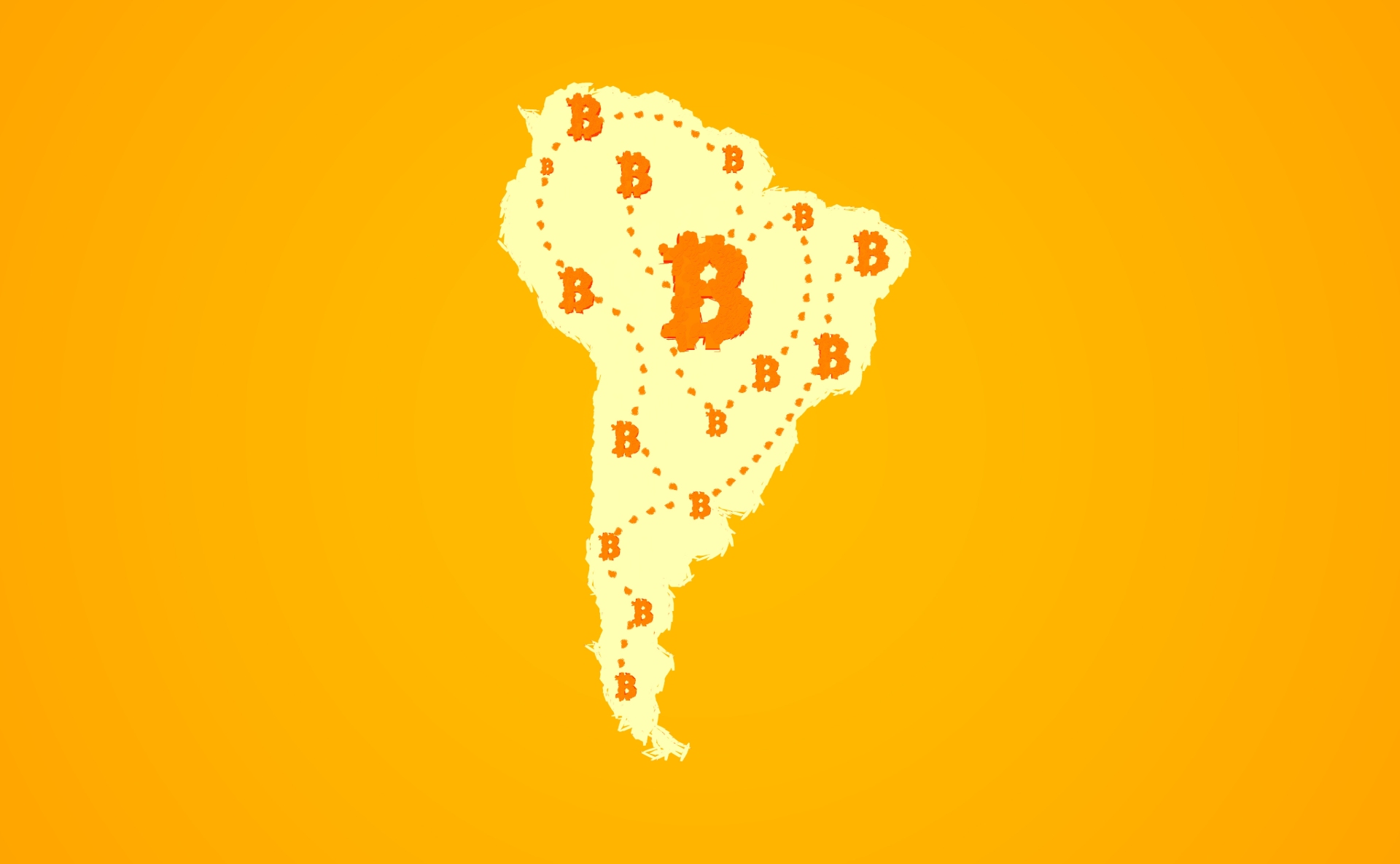
ละตินอเมริกา (LATAM) มีปริมาณคริปโตมากกว่า 730 พันล้านดอลลาร์ในปี 2025 ซึ่งเป็นการเพิ่มขึ้น 60% เมื่อเทียบปีซึ่งทำให้ภูมิภาคนี้รับผิดชอบต่อกิจกรรมคริปโตทั่วโลกประมาณ 10%
ในปี 2026 ผู้เล่นสถาบันเริ่มพิจารณาภูมิภาคอย่างจริงจัง กฎระเบียบกำลังตกผลึก และตัวขับเคลื่อนโครงสร้างตั้งแต่ปี 2025 ไม่แสดงสัญญาณว่าจางหายไปแต่ภูมิภาคนี้ไม่ได้เป็นเรื่องเดียว และปี 2026 จะทดสอบว่าโมเมนตัมปัจจุบันสร้างขึ้นจากพื้นฐานที่มั่นคงหรือการมองโลกในแง่ดีเชิงเก็งกำไรหรือไม่
ข้อเท็จจริงด่วน
- ผู้ใช้ crypto ที่ใช้งานอยู่รายเดือนของ LATAM เพิ่มขึ้น 18% เมื่อเทียบเป็นรายปี (YoY) เร็วกว่าสหรัฐสามเท่า
- อาร์เจนตินาเพิ่มการเจาะผู้ใช้รายเดือน 12% ซึ่งคิดเป็นมากกว่าหนึ่งในสี่ของกิจกรรม crypto ของภูมิภาค
- มากกว่า 90% ของกระแสคริปโตของบราซิลเกี่ยวข้องกับ stablecoin
- สามประเทศ LATAM ติดอันดับใน 20 อันดับแรกของโลก: บราซิล (5) เวเนซุเอลา (18) อาร์เจนตินา (20)
- การดาวน์โหลดแอป crypto ของเปรูเพิ่มขึ้น 50% ในปี 2025 โดยมีการดาวน์โหลด 2.9 ล้านครั้ง
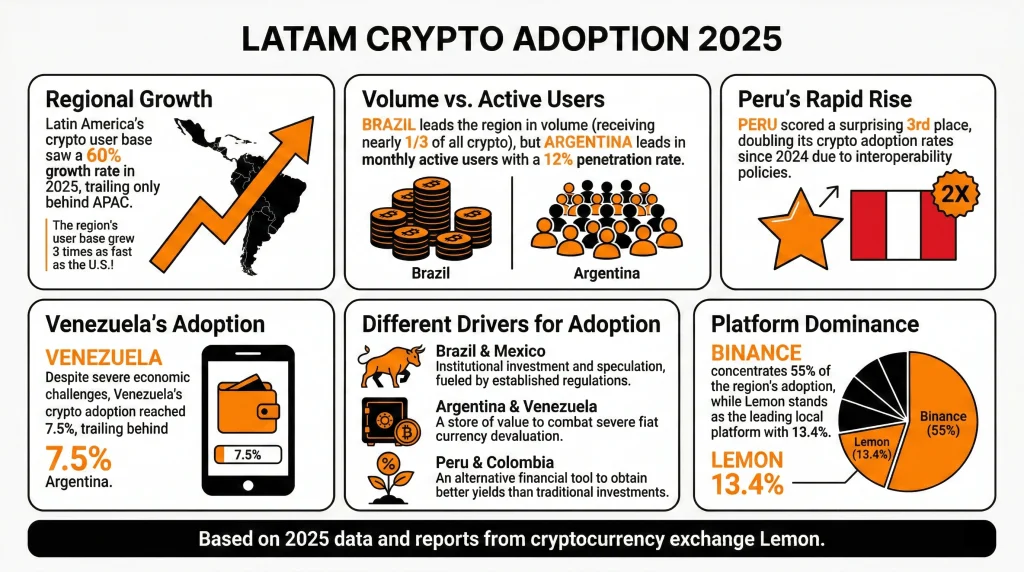
จากเครื่องมือการอยู่รอดไปจนถึงโครงสร้างพื้นฐานทางการเงิน
ละตินอเมริกาไม่ได้ยอมรับสกุลเงินดิจิทัลเนื่องจากการเก็งกำไรมันยอมรับเพราะระบบการเงินแบบดั้งเดิมล้มเหลวคนธรรมดาซ้ำ ๆในช่วง 15 ปีที่ผ่านมา อัตราเงินเฟ้อเฉลี่ยต่อปีทั่วทั้งห้าเศรษฐกิจที่ใหญ่ที่สุดของภูมิภาคอยู่ที่ 13% เทียบกับเพียง 2.3% ในสหรัฐอเมริกาในช่วงเวลาเดียวกัน
ในเวเนซุเอลาสูงถึง 65,000% ในหนึ่งปีเดียวในอาร์เจนตินาสูงกว่า 220% ในปี 2024สำหรับคนนับล้านการถือเงินออมในสกุลเงินท้องถิ่นเป็นการทำลายตนเองอย่างช้าๆสเตเบิลคอยน์กลายเป็นการตอบสนองตามธรรมชาติสินทรัพย์ดิจิทัลที่เชื่อมโยงกับดอลลาร์สหรัฐนำเสนอการจัดเก็บมูลค่าที่เชื่อถือได้ ความสามารถในการโอนแบบไร้พรมแดน และการเข้าถึงโดยไม่มีบัญชีธนาคาร
ซึ่งแตกต่างจากตะวันตกที่ที่ crypto ถูกมองว่าเป็นเครื่องมือเก็งกำไรมากขึ้นใน LATAM มันกลายเป็นเครื่องมือทางการเงินที่จำเป็นอย่างไรก็ตามไดรเวอร์การรับเลี้ยงบุตรบุญธรรมไม่เหมือนกันทั้งหมดในภูมิภาคบราซิลและเม็กซิโกเป็นเรื่องราวของสถาบัน ซึ่งขับเคลื่อนโดยการมีส่วนร่วมในตลาดที่มีการควบคุมและผู้เล่นทางการเงินที่ได้รับการ
อาร์เจนตินาและเวเนซุเอลายังคงมีมูลค่าอยู่เสมอ โดยคริปโตทำหน้าที่เป็นการป้องกันความเสี่ยงโดยตรงต่อการล่มสลายของ fiatและเปรูและโคลอมเบียเป็นตลาดที่แสวงหาผลตอบแทนมากขึ้น โดยที่ crypto เสนอผลตอบแทนที่บัญชีออมทรัพย์แบบดั้งเดิมไม่สามารถจับคู่ได้
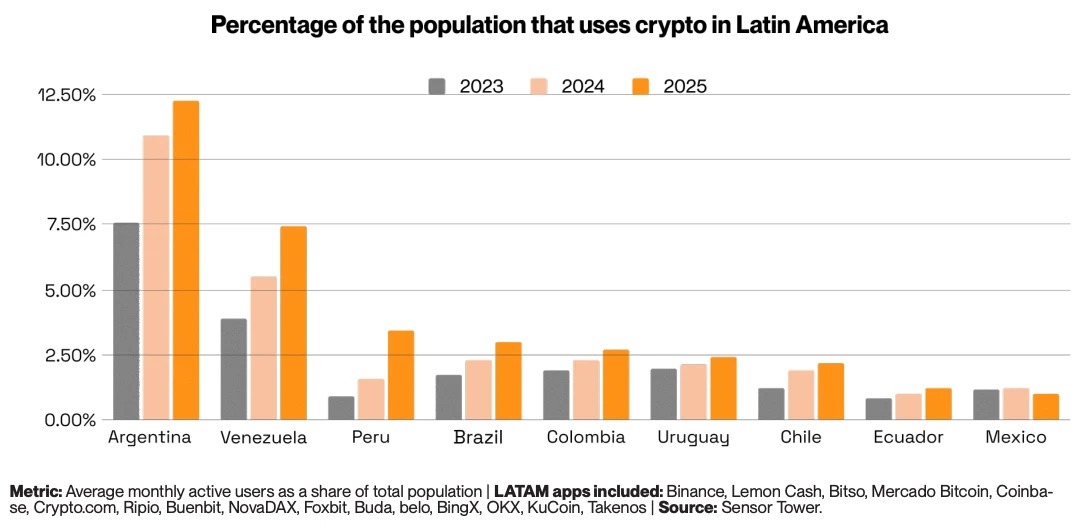
LATAM ใช้สกุลเงินดิจิทัลเร็วแค่ไหน
ปริมาณคริปโตออนเชนของ LATAM เพิ่มขึ้น 60% เมื่อเทียบเป็นปีในปี 2025ภูมิภาคนี้มีปริมาณสะสมเกือบ 1.5 ล้านล้านดอลลาร์ตั้งแต่กลางปี 2022 โดยสูงสุดที่ 87.7 พันล้านดอลลาร์ในเดือนเดียวในเดือนธันวาคม 2024
ผู้ใช้ crypto ที่ใช้งานรายเดือนใน LATAM ยังเพิ่มขึ้น 18% ในปี 2025 เร็วกว่าสหรัฐสามเท่า
Stablecoin เป็นยานพาหนะหลักที่ขับเคลื่อนการนำมาใช้ครั้งนี้จาก 730 พันล้านดอลลาร์ที่ได้รับในปี 2025 324 พันล้านดอลลาร์เคลื่อนผ่านธุรกรรม stablecoin ซึ่งเพิ่มขึ้น 89% เมื่อเทียบเป็นรายปีในบราซิล มากกว่า 90% ของกระแสคริปโตทั้งหมดเกี่ยวข้องกับ stablecoin และในอาร์เจนตินา stablecoin คิดเป็นมากกว่า 60% ของกิจกรรม
เมื่อมองไปในอนาคต ตลาดสกุลเงินดิจิทัลละตินอเมริกาคาดว่าจะสูงถึง 442.6 พันล้านดอลลาร์ภายในปี 2033 โดยเติบโตในอัตราต่อปีรวม 10.93% จากปี 2025 ตามรายงานของ IMARC Group
สำหรับเทรดเดอร์ ความเร็วในการรับเลี้ยงบุตรบุญธรรมมีความสำคัญน้อยกว่าสิ่งที่ขับเคลื่อนไหว: ภูมิภาคที่มีผู้คน 650 ล้านคนสร้างโครงสร้างพื้นฐานทางการเงินแบบขนานแบบเรียลไทม์ โดยมี stablecoin เป็นรากฐาน
การเปลี่ยนสถาบัน
สำหรับประวัติศาสตร์คริปโตส่วนใหญ่ของ LATAM การนำมาใช้เป็นแบบล่างขึ้นบนผู้ใช้รายย่อยที่ไม่มีธนาคารหรือต่ำกว่าธนาคารส่งผลักดันปริมาณผ่านการแลกเปลี่ยนในท้องถิ่นตอนนี้ภาพนั้นกำลังเปลี่ยนแปลงที่ปลายด้านบนของตลาด
ในเดือนกุมภาพันธ์ 2026 Crypto Finance Group ซึ่งเป็นส่วนหนึ่งของบริษัทแลกเปลี่ยนชั้นนำระดับโลก Deutsche Börse Group ประกาศขยายตัวไปยังละตินอเมริกา โดยกำหนดเป้าหมายธนาคาร ผู้จัดการสินทรัพย์ และตัวกลางทางการเงินที่ต้องการโครงสร้างพื้นฐานการดูแลและซื้อขายระดับสถาบัน
ธนาคารและฟินเท็กแบบดั้งเดิมกำลังทำตามตัวอย่างตอนนี้ Nubank ให้รางวัลแก่ลูกค้าสำหรับการถือหุ้น USDCการแลกเปลี่ยน B3 ของบราซิลได้อนุมัติ XRP และ SOL ETF แรกของโลกก่อนสหรัฐในปี 2025การแลกเปลี่ยนแบบรวมศูนย์ รวมถึง Mercado Bitcoin, NovaDax และ Binance ได้จดทะเบียนคู่ซื้อขายใหม่กว่า 200 คู่สกุลเงิน BRL ตั้งแต่ต้นปี 2024
ในเดือนมีนาคม 2025 ฟินเทค Meliuz ของบราซิลกลายเป็นบริษัทแรกที่ซื้อขายต่อสาธารณะในประเทศที่เปิดตัวกลยุทธ์การสะสม Bitcoin โดยปัจจุบันถือหุ้น 320 BTC
“การนำเข้ารหัสคริปโตใน LaTam เป็นระดับโลกแล้วสิ่งที่ตลาดต้องการตอนนี้คือการกำกับดูแลระดับสถาบัน และนั่นคือเหตุผลที่เราอยู่ที่นี่” — Stijn Vander Straeten ซีอีโอของ Crypto Finance Group
กรณีการใช้งานการโอนเงินคริปโต
ละตินอเมริกาได้รับเงินหลายร้อยพันล้านดอลลาร์ต่อปีจากคนงานในต่างประเทศ ทำให้การโอนเงินเป็นหนึ่งในกรณีการใช้งานคริปโตที่เป็นรูปธรรมและวัดได้มากที่สุดในภูมิภาคบริการโอนแบบดั้งเดิมคิดค่าโดยเฉลี่ย 6.2% ต่อธุรกรรมในการโอนเงิน 300 เหรียญสหรัฐ นั่นคือค่าธรรมเนียมประมาณ 20 เหรียญสหรัฐ
โครงสร้างพื้นฐานที่ใช้บล็อกเชนในวงกว้างขึ้นทำให้มีการลดค่าธรรมเนียมอย่างมากBitcoin นำต้นทุนอยู่ที่ประมาณ 3.12 เหรียญสหรัฐต่อการโอน $100ในขณะที่ทางเลือกที่ถูกกว่าเช่นโครงสร้างพื้นฐาน XRP หรือ Ethereum layer-2 สามารถลดลงเหลือน้อยกว่า 0.01 เหรียญสหรัฐ
สำหรับคนงานข้ามชาติที่ส่งกลับบ้าน 1,500 เหรียญสหรัฐไปยังเปรู การเปลี่ยนจากธนาคารเดิมจะช่วยประหยัดค่าจ้างรายสัปดาห์เฉลี่ยของเปรูในค่าธรรมเนียมเพียงอย่างเดียว
สภาพแวดล้อมการกำกับดูแลคริปโตของ LATAM
ตัวแปรที่จะกำหนดมากที่สุดว่าLATAM มีศักยภาพสูงสุดในปี 2026 หรือไม่ คือการควบคุมcryptoและที่นี่ภาพนั้นผสมกันอย่างแท้จริง
บราซิลเป็นผู้นำภูมิภาคด้วยกฎหมายสินทรัพย์เสมือนซึ่งครอบคลุมการแยกสินทรัพย์ ใบอนุญาต VASP ข้อกำหนด AML/KYC และมาตรฐานทุนนอกจากนี้ยังใช้กฎการเดินทางสำหรับการโอน VASP ภายในประเทศ ซึ่งมีผลบังคับใช้ในเดือนกุมภาพันธ์ 2026อย่างไรก็ตาม ข้อเสนอที่ถกเถียงกันเพิ่มเติมบางประการ รวมถึงขีด จำกัด 100,000 ดอลลาร์สหรัฐสำหรับธุรกรรม stablecoin ข้ามพรมแดน และการห้ามการโอนเงินกระเป๋าเงินที่ดูแลตนเอง ยังคงอยู่ภายใต้การปรึกษาอย่างต่อเนื่อง
กฎหมาย Fintech ปี 2018 ของเม็กซิโกยังคงเป็นหนึ่งในการยอมรับสินทรัพย์เสมือนจริงที่เก่าแก่ที่สุดในโลกกฎหมาย Fintech ปี 2023 ของชิลีได้จัดตั้งใบอนุญาตสำหรับการแลกเปลี่ยน กระเป๋าเงิน และผู้ออก stablecoin โดยยอมรับสินทรัพย์ดิจิทัลเป็น 'เงินดิจิทัล' อย่างเป็นทางการ
โบลิเวียย้อนกลับการห้ามคริปโตเป็นเวลานานหลายทศวรรษในเดือนมิถุนายน 2024 โดยอนุญาตให้ทำธุรกรรมสินทรัพย์ดิจิทัลอาร์เจนตินาแนะนำการลงทะเบียนแลกเปลี่ยนภาคบังคับในปี 2025และเอลซัลวาดอร์ยังคงขยายความคิดริเริ่มทางเศรษฐกิจที่โดดเด่นแม้จะลบสถานะการชำระเงินตามกฎหมายของ Bitcoin
สิบประเทศทั่วภูมิภาคมีกรอบคริปโตอย่างเป็นทางการในบางประเภทแต่สำหรับเทรดเดอร์ ความแตกต่างทางกฎระเบียบยังคงเป็นความเสี่ยงจริงและเนื่องจากบราซิลได้รับเกือบหนึ่งในสามของปริมาณคริปโต LATAM ทั้งหมด การพลิกกลับนโยบายที่สำคัญใด ๆ อาจส่งผลมากเกินไป
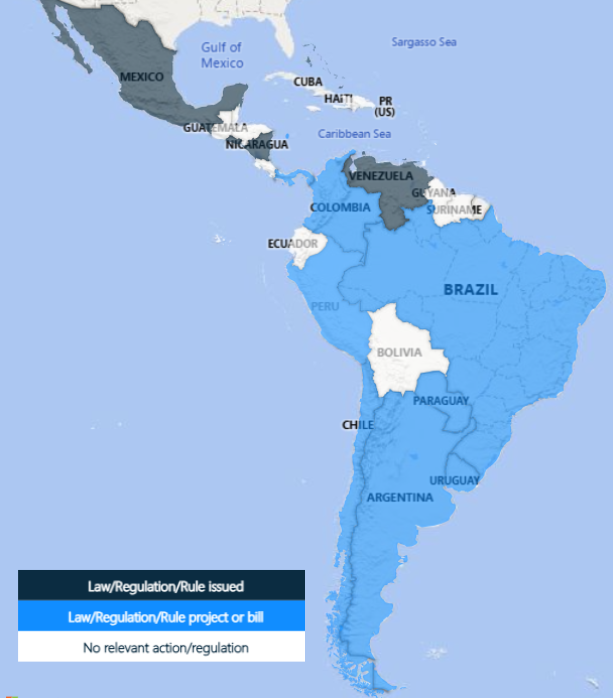
สิ่งที่เทรดเดอร์ควรดู
โมเมนตัมสถาบันของบราซิลเป็นแนวโน้มโครงสร้างที่สำคัญที่สุดด้วยปริมาณออนเชนจำนวน 318.8 พันล้านดอลลาร์ในปี 2025 บราซิลจึงเป็นตลาด LATAM อย่างมีประสิทธิภาพ
ผลลัพธ์ของการให้คำปรึกษา stablecoin ของบราซิลอาจมีอิทธิพลอย่างมากข้อ จำกัด เกี่ยวกับสกุลเงินเสถียรต่างประเทศในการชำระเงินในประเทศจะส่งผลกระทบโดยตรงต่อประเภทสินทรัพย์ที่มีการซื้อขายมากที่สุดในตลาดที่โดดเด่นของภูมิภาค
อาร์เจนตินาคือการเล่นความผันผวนการแทรกซึมของผู้ใช้รายเดือนที่ 12% และการดาวน์โหลดแอป crypto 5.4 ล้านครั้งในปี 2025 บ่งบอกถึงการมีส่วนร่วมของผู้ค้าปลีกที่ลึกซึ้งและเพิ่มขึ้น
โคลอมเบียเป็นตลาดที่มีคำเตือนเบื้องต้นที่ควรดูค่าเสื่อมราคา 5.3% ของเปโซในปี 2025 และวิกฤตทางการคลังที่ลึกซึ้งยิ่งขึ้นกำลังขับเคลื่อนการไหลเข้าของ stablecoin ในรูปแบบที่สะท้อนวิถีของอาร์เจนตินาในปีก่อนหน้าหากสถานการณ์มหภาคของโคลอมเบียแย่ลงอีก การยอมรับ crypto อาจเร่งขึ้น
นอกจากนี้ยังมีความเสี่ยงในการกระตุ้นการแลกเปลี่ยนที่เล่นการแลกเปลี่ยนคริปโต Binance เป็นการแลกเปลี่ยนหลักสำหรับผู้ใช้คริปโต LATAM มากกว่า 50%หากตลาดซื้อขายเผชิญกับการดำเนินการด้านกฎระเบียบการหยุดชะงักด้านการดำเนินงาน หรือการแข่งขัน อาจส่งผลกระทบต่อตลาดขนาดใหญ่
บรรทัดล่าง
ตลาด crypto ของละตินอเมริกาได้เข้าสู่ช่วงใหม่ตัวขับเคลื่อนโครงสร้างที่ทำให้อุปสงค์คริปโตเบื้องต้นในภูมิภาคยังไม่หายไป: เงินเฟ้อ การโอนเงิน การยกเว้นทางการเงิน และความไม่มั่นคงของสกุลเงินยังคงดำเนินอยู่
สิ่งที่เปลี่ยนแปลงคือเลเยอร์ที่สร้างขึ้นด้านบนโครงสร้างพื้นฐานของสถาบัน กรอบการกำกับดูแล การยอมรับคลังขององค์กร และการแลกเปลี่ยนเงินทุนทั่วโลกที่ไหลเข้าสู่ภูมิภาคที่จนกระทั่งเมื่อไม่นานมานี้เป็นส่วนใหญ่เป็นอิสระ
ปริมาณการเติบโตใกล้กับ -250% ของบราซิลในปี 2025 และตำแหน่งที่ได้รับเกือบหนึ่งในสามของสกุลเงินดิจิทัล LATAM ทั้งหมดเป็นตัวกำหนดการพัฒนาของตลาดวิถีการกำกับดูแล การตัดสินใจเกี่ยวกับนโยบาย stablecoin และท่อ ETF จะกำหนดโทนเสียงสำหรับภูมิภาคอย่างมีประสิทธิภาพในปี 2026
สำหรับเทรดเดอร์ ตัวเลขการเติบโตหลักเป็นจริง แต่ความเสี่ยงด้านสมาธิ ความไม่แน่นอนด้านกฎระเบียบ และความแตกต่างในระดับประเทศที่อยู่ต่ำกว่านั้นก็เช่นกัน
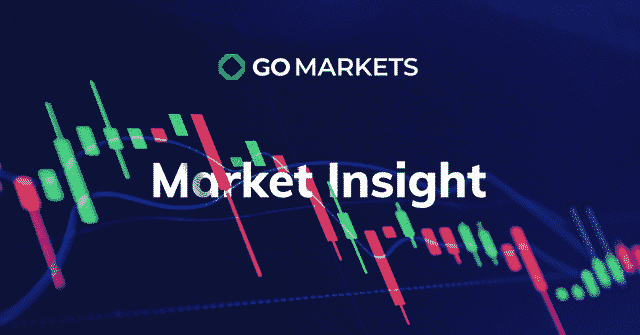

Moderna Inc. (MRNA) reported it latest financial numbers before the opening bell in the US on Thursday. The pharmaceutical company reported results that beat Wall Street estimates, sending the stock price higher on the day. Total revenue reported at $7.211 billion in the fourth quarter vs. $6.798 billion expected.
Earnings per share at $11.29 per share vs. estimate of $9.96 per share. Stéphane Bancel, CEO of Moderna commented on the last year’s performance following the latest results: "In 2021, we delivered 807 million doses with approximately 25% of those doses going to low- and middle-income countries, and we will continue to scale in 2022 to help end the COVID-19 pandemic. Moderna has experienced exponential growth and we have more than doubled the size of our team over the last year with a global team of 3,000.
We also have announced plans to scale to 21 commercial subsidiaries across the world, including four new locations in Asia and six new locations in Europe. We continue to expand and advance our industry-leading mRNA pipeline with 44 programs in development. We look forward to clinical readouts from our therapeutics development candidates later in 2022 in rare genetic diseases and oncology.
We are entering 2022 with a remarkable team and strategic priorities to continue advancing mRNA vaccines and therapeutics to impact human health." Moderna Inc. (MRNA) chart (Weekly) Share price of Moderna surged by over 10% during Thursday, trading at $147.53 per share. Here is how the stock has performed in the past year – 1 Month: +0.18% 3 Month: -45.54% Year-to-date: -41.38% 1 Year: +0.34% Moderna Inc. is the 274 th largest company in the world and 21 st largest pharmaceutical company with a total market cap of $59.54 billion. You can trade Moderna Inc. (MRNA) and many other stocks from the NYSE, NASDAQ, HKEX and the ASX with GO Markets as a Share CFD.
Sources: Moderna Inc., TradingView, MetaTrader 5, CompaniesMarketCap


Mastercard Incorporated (MA) reported its latest financial results before the opening bell on Wall Street on Thursday. The US financial services company reported revenue of $5.497 billion in Q2, beating analyst estimate of $5.267 billion. Earnings per share reported at $2.56 per share vs. $2.36 per share expected. ''We had strong revenue and earnings growth again this quarter, as overall consumer spending remained robust and cross-border volumes grew 58% versus year ago,'' Michael Miebach, CEO of Mastercard said in a press release following the results. ''Increasing inflationary pressures have yet to significantly impact overall consumer spending but we will continue to monitor this closely.
We have a well-diversified business model and the demonstrated ability to deliver strong operating margins through up and down cycles,'' Miebach concluded. Mastercard Incorporated (MA) chart Shares of MasterCard were trading higher on Thursday after beating Wall Street expectations, up by around 1% at $348.50 per share. Here is how the stock has performed in the past year: 1 Month +10.56% 3 Month -7.92% Year-to-date -2.92% 1 Year -10.29% Mastercard Incorporated price targets JP Morgan $425 Wells Fargo $400 Piper Sandler $298 Mizuho $375 Truist Securities $420 Barclays $430 BMO Capital $402 Morgan Stanley $452 Mastercard Incorporated is the 19 th largest company in the world with a market cap of $338.14 billion.
You can trade Mastercard Incorporated (MA) and many other stocks from the NYSE, NASDAQ, HKEX and the ASX with GO Markets as a Share CFD. Sources: Mastercard Incorporated, TradingView, MetaTrader 5, Benzinga, CompaniesMarketCap


The Kansas City Federal Reserve is set to host the 45 th Annual Symposium at Jackson Hole Lodge in Wyoming’s Grand Teton National Park. Some of the countries and world’s most important central bankers, economists, and academics will be meeting to discuss the biggest issues facing the global economy. The key issue on the agenda is of “Reassessing Constraints on the Economy and Policy.” All eyes will be on Jerome Powell, with the chairman of the Federal Reserve expected to speak on Thursday and provide an update on the proceedings of the conference.
At last year’s event Powell was caught out after stating that inflation was transitory, only to see it become a huge long-lasting issue. Therefore, he may try and correct this perception and portray a much more conservative attitude. There is also a view from some analysts that the Fed came across too dovish in the July meeting which led to the market rally.
At this stage the market has priced in a 75-bps increase at the September meeting, however this may change. With key inflation measures slowing somewhat, the question will be whether the fed continue its aggressive interest rate hikes or eases their policy to avoid a potential recession. The market will be hoping that Powell provides some clues for what the Fed plans to do after rates peak.
They will be hoping for clarity over whether the bank will hold the rates at the high levels for some time or lower them straight away to avoid a recession. Market participants should be weary that although Jackson Hole may provide some important context to the future rates, no official policies will be set. The conference will most likely have a relatively small impact on the market, it still has the potential to provide some volatility for both equities and currency if significant attitude shifts are expressed.
The USD is currently at 5 year highs and with some positive catalysts for the currency, it may continue to rise further if the Fed continues to be aggressive in its rate hikes.


JD.com Inc. (JD) announced its fourth-quarter earnings numbers on Thursday. The Chinese e-commerce company reported revenue of $43.422 billion (up by 23% year-over-year), slightly above Wall Street analysts forecast of $43.186 billion. Earnings per share reported at $0.35 per share vs. $0.28 per share expected. ''We are pleased to finish the year with a set of strong results on both the top and bottom lines as we continued to execute and deliver on our strategic priorities,'' said Sandy Xu, Chief Financial Officer of JD.com. ''During the quarter, we further optimized our operational efficiency through technology and innovation, increasing our competitiveness as well as our ability to support our business partners.
In 2022, we will continue to execute our business strategies and focus on sustainable high-quality growth across all of our business lines,'' Xu added. JD.com Inc. (JD) Share price of JD dropped following the latest financial results on Thursday, after the weakest revenue growth in six quarters. The stock was down by around 16% at $52.13 pe share.
Here is how the stock has performed in the past year – 1 Month: -31.40% 3 Month: -34.13% Year-to-date: -25.20% 1 Year: -41.77% JD.com Inc. is the 163 rd largest company in the world with total market cap of $85.95 billion. You can trade JD.com Inc. (JD) and many other stocks from the NYSE, NASDAQ, HKEX and the ASX with GO Markets as a Share CFD. Trading Derivatives carries a high level of risk.
Sources: JD.com, TradingView, MetaTrader 5, CompaniesMarketCap
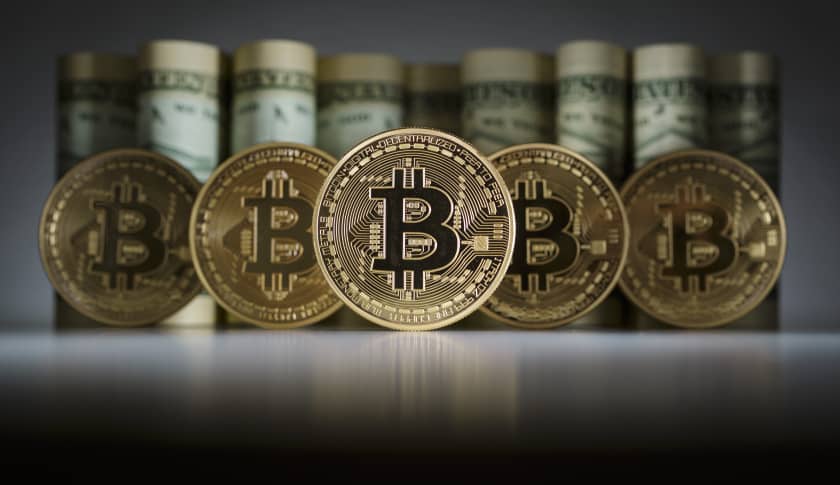

The recent price action of the Bitcoin suggests that the leading cryptocurrency may be ready for another sell off. Since last November when the currency peaked it has seen a sharp decline with retracements along the way. With inflation and recessionary pressures prevalent short-term volatility remains high as the market determines how to price the asset.
The Jackson Hole symposium is set to begin on Thursday in the USA and may effect the price in the short term if bullish or bearish sentiment comes from the event. The Chart The long-term outlook for Bitcoin is bearish. With constant sell downs and both the 50 Day and 200 day moving average both firmly pushing towards the downside.
Furthermore, the price has not been able to sustain any significant rally and has broken through its major support at $30,000 USD. Recent Price Action The concern for BTC is that it has sold out of the channel that it had been consolidating in and has therefore rejected the upward move. Similarly, the price has followed this action, twice before with both resulting in sell offs.
These patterns appear as traps for bulls because, buyers begin to feel FOMO and then enter long only to be ‘fake out’ as sellers soak up the buying volume and then continue to push the price back down. The RSI also supports more selling as it currently sits at 38 whilst the prior sell offs reached below 20. The RSI also looks to have made a triple top as shown in the chart further indicating that sellers may be ready to drive the price down further.
The concern for buyers is that this current sell off may not be finished. The 5-hour pattern looks to be forming a bear flag/pennant. If the price can break below it may fall to the next support at $17,000/18,000 USD.
This pattern is to be expected and is just reflective of sellers taking a breath before they continue to push the price lower. The price has also fallen back below the 50-period moving average indicting short term bearish sentiment. If the short-term target of $ 17,000/18,000 USD cannot hold the next target is the $13,500 USD level.


Iron ore prices have continued to rally to a six-month high this week, due in part to reports of potential easing of China’s strict COVID-19 policy and their signs of improved steel demand. The Singapore Exchange has the iron ore futures price reaching $165 USD a tonne on Tuesday, this is the highest level since July 2021. The price increase could have been attributed to a report that concluded that Beijing was considering potentially moving away from a zero-tolerance approach to COVID-19.
If this occurs, it could potentially put an end to the stop-start nature of China’s economic activities which has been happening since the start of COVID-19 pandemic. Another report indicated that experimental opening measures could arrive in a few select cities across China as early as June, which will coincide with the beginning of their Summer. A potential sign that China’s stimulus is contributing to rebound in growth can be evident earlier this month with the release of China’s Manufacturing Purchasing Managers Index (PMI).
The PMI had increased to 50.2, which was greater than the economists’ consensus of 49.8. Some experts and economists believe that the PMI’s figures released next month of March will likely provide a better indication of the true state of China’s economy, given the effects of the Lunar New Year period in the first two months of the year. Iron ore supplies could also heavily affect its global price.
There are concerns about the supply disruptions caused by the conflict between Russia and Ukraine, given their iron ore sector accounts for 100 million tonnes and 81 million tonnes a year, respectively. Heavy rain in the south-east of Brazil earlier this year, linked to the La Nina weather pattern, has forced producers to cease operations. Brazil is the second largest iron ore producer behind Australia, producing almost 400 million tonnes compared to Australia’s 900 million tonnes.
The increase in price to iron ore and energy has driven the AUD/USD to reach a new four month high of 74.41 US cents. Commonwealth Bank (CBA) believes that the currency is currently on track to end the first quarter near 74 US cents. They have updated the fair value estimate of the Australian dollar following the release of the RBA’s commodity price index for February.
CBA’s fair value for the AUD/USD ranges between 78-90 US cents, centred on 84 US cents. All in all, the AUD/USD has a healthy positive correlation with the price of iron ore due Australia being the largest producer. Investors can research the supply and demand of iron ore to achieve a good potential indication of the strength of the AUD/USD.
If you would like to take this opportunity to trade on the AUD/USD and require a trading account, you can open a trading account with GO Markets. Source: GO Markets MT5, Tradingview, Tradingeconmics, Statista, WSJ, Science.org, AFR

